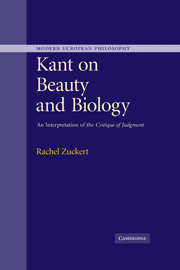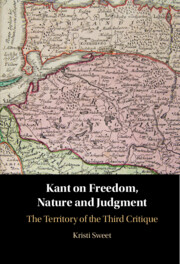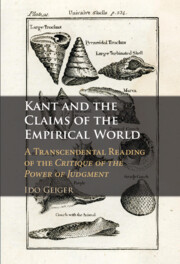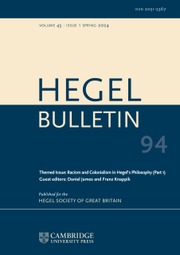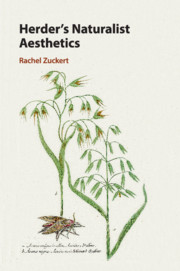Kant on Beauty and Biology
Kant's Critique of Judgment has often been interpreted by scholars as comprising separate treatments of three uneasily connected topics: beauty, biology, and empirical knowledge. Rachel Zuckert's book interprets the Critique as a unified argument concerning all three domains. She argues that on Kant's view, human beings demonstrate a distinctive cognitive ability in appreciating beauty and understanding organic life: an ability to anticipate a whole that we do not completely understand according to preconceived categories. This ability is necessary, moreover, for human beings to gain knowledge of nature in its empirical character as it is, not as we might assume it to be. Her wide-ranging and original study will be valuable for readers in all areas of Kant's philosophy.
- A comprehensive study proposing a unified interpretation of the three topics of Kant's Critique
- Places Kant's theory in its historical context
- Includes a detailed analysis of the Critique
Reviews & endorsements
Review of the hardback: '… impressive in its intellectual scope, its clearly-written quality, its well-informed, considerable citation of the secondary literature in Kant scholarship and its manner of arguing for a variety of nuanced positions that arise within the text's many subthemes. It is a contribution that stands solidly on the shoulders of the presently leading Kant scholarship and that integrates itself well into it.' British Journal for the History of Philosophy
Product details
November 2010Paperback
9780521172332
424 pages
229 × 152 × 24 mm
0.62kg
Available
Table of Contents
- Introduction
- 1. The problem: unity of the diverse
- 2. Reflective judgment and its principle: preliminary remarks
- Part I. Teleological Judgment:
- 3. The critique of teleological judgment: purposiveness is the 'highest formal unity'
- 4. A merely subjective principle: time and the 'peculiarities of our intellects'
- Part II. Aesthetic Judgment: Introduction
- 5. Beautiful objects: subjectively purposive form
- 6. Aesthetic pleasure: the feeling of subjective, projective temporality
- 7. The free harmony of the faculties: purposiveness as the principle of aesthetic Beurteilung
- 8. The justification of aesthetic judgment: purposiveness as the principle of reflective judging
- Conclusion.

